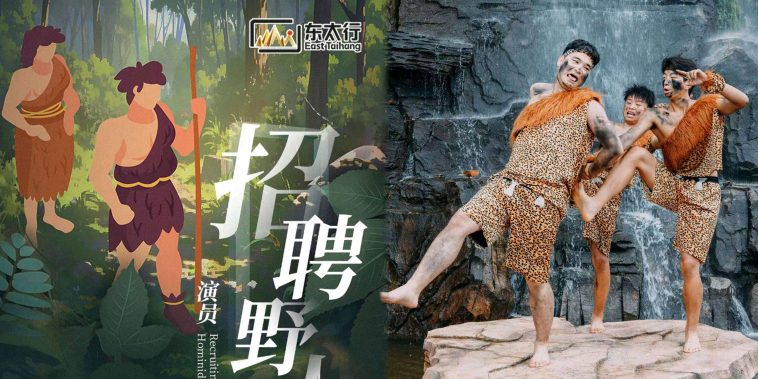Draped in a blanket over one shoulder, crowned with willow branches, and wailing like banshees, two sophomore students stomp and circle each other. Moments later, they break into a frenzied dance, as if discovering the camera for the first time. The performance is raw, absurd, and primitive.
More than a viral stunt, the video was an audition for civil engineering major Meng Yan and his friend Meng Jiawei, a supply chain management student. The duo from the northern Hebei province were vying for roles as “caveman” performers at the East Taihang Scenic Area in Wu’an City.
This past summer, at least three scenic spots across the country turned to such roles to draw more tourists and generate social media buzz. And job postings for such performers have drawn a flood of applications, with young Chinese eager to shed everyday pressures, don primitive garb, and engage in playful, unscripted performances.
A resort manager from the Shuanglonggou scenic area in the southern Guangxi Zhuang Autonomous Region told local media they conducted over 20 interviews daily after posting job openings in July. At the East Taihang scenic area, a recruitment notice on Douyin, China’s version of TikTok, prompted a surge of applications that overwhelmed their account, crashing the automated response system.
“The overwhelming interest far exceeded our expectations,” said Bao Saiyin, a digital marketing representative from East Taihang Cultural Tourism Group. “We anticipated only a few dozen applicants, but the number quickly surged to tens of thousands.”
Bao added that applicants came from diverse backgrounds, including college students, teachers, gap-year travelers, and content creators.
Videos of these modern cavemen quickly went viral on Chinese social media, showing them climbing trees, wailing wildly, and playfully “stealing” food from unsuspecting tourists. One related hashtag amassed over 41 million views on Douyin, with nearly a million more on the lifestyle platform Xiaohongshu.
“You think they’re putting on a disguise, but in reality, they’re taking it off,” wrote one of the most-liked comments on Douyin, praising the job as an unexpected form of liberation.
Primal urge
The East Taihang Scenic Area’s recruitment ad cut straight to the point. A daily wage of 200 yuan ($28), free accommodation, and a simple gig — embrace your wild side and abandon human language.
“Both socially anxious and outgoing people are welcome to apply… No talking allowed — only ‘oh-ho’ is permitted,” read the notice this past July. Duties? “Interact with tourists, jump around, or simply slack off.”
The next day, hundreds of messages flooded in from aspiring cavemen. Applicants showcased their unique “qualifications” — one boasted expertise in Python and other computer languages, another claimed mastery over caveman-style yelling, while one especially eager candidate offered to work for free.
The deluge forced Bao’s team to change tactics. Candidates were asked to submit audition videos on Douyin using the hashtag “East Taihang Caveman.”
“Everyone has a version of Hamlet in their heart, and likewise, everyone has a little caveman,” said Bao. “By posting videos online, we invited public comments and selected candidates based on number of likes and individual performance — those who seemed the most convincing, the most ‘caveman-like.’”
Among the wave of submissions, Meng Yan and Meng Jiawei’s video quickly captured attention. The pair showcased playful and exaggerated caveman antics, striking a chord with viewers and earning over 1,100 likes and nearly 7,000 shares on Douyin.
To their surprise, both received job offers within two days. Out of nearly 500 applicants, only 20 performers were chosen for East Taihang’s monthlong campaign, with the duo participating in a seven-day rotation.
Without any training or instructions, Meng and nine other performers, clad in primitive outfits and with charcoal-smudged faces, were set loose in a designated mountain-based “performance zone.”
As an introvert, Meng, initially struggled to embrace the carefree spirit the role demanded. “I couldn’t let go completely on the first day,” he admitted. “After a few hours of interacting with tourists, my facial expressions felt stiff.”
Then the wilderness worked its magic. Inspired by his fellow performers enthusiastically interacting and dancing, Meng found a more uninhibited version of himself.
“After putting on the costume and applying the makeup, I suddenly felt like I could let loose, walking with my head held high and chest out,” he said. “I imagined myself as one of those ancient savages, which made me feel more confident.”
Fully embracing the role, Meng climbed trees to perform pull-ups, mimicked tourists, and pretended to snatch food while yelling hysterically.
“Those days were quite enjoyable because I could briefly escape from real life,” Meng told Sixth Tone. “It’s usually hard to find that state of mind where I don’t have to think about anything at all.”
Like many of his peers, Meng is anxious about his future in a competitive job market. “I’m not sure what to do after university, and the pressure of finding a job is a lot,” he said. While he dreams of a nomadic lifestyle, his parents’ expectations push him toward stability in their hometown.
“That kind of life is just my wonderful fantasy,” he said. “In reality, I’m quite influenced by my family’s values. Most likely, I’ll find a job and live day by day.”
Meng’s friend, Jiawei, nicknamed “chieftain” for his height and strong build, found similar solace in the caveman role. “Those seven days truly allowed me to release all the stress and the negative emotions brought on by various difficulties in life all at once,” he said.
Once in costume and without his glasses, Jiawei fully embraced his inner caveman. He roared with abandon, walked on all fours, pounded his chest, and lifted a fake bone triumphantly while engaging with eager tourists.
“I feel like I had truly become an ape at that time, hopping and jumping on the rocks at the top of the mountain, and I really enjoyed the process,” Jiawei said.
Marketing gone wild
While the caveman campaign offered participants a chance for self-expression, its true purpose was strategic. Scenic spots across the country have often leveraged such initiatives to differentiate themselves in China’s fiercely competitive tourism market.
China’s tourism industry has seen a strong rebound since pandemic travel restrictions eased. In the first three quarters of 2024 alone, domestic trips reached 4.237 billion, a 15.3% year-on-year increase. To attract visitors amid this revival, many scenic spots and cities have turned to creative strategies and viral social media campaigns.
Tourism in Zibo in the eastern Shandong province, for example, surged in 2023 after government promotions fueled its popular barbecue culture. In March, a scenic spot in Kaifeng, in the central Henan province, gained national attention through viral videos of traditional matchmaking performances. Even the remote Ailao Mountains in the southwestern Yunnan province found fame when a blogger’s mysterious solo adventure went viral.
“Such internet fame is becoming increasingly common,” said Bao. “While our scenic area’s revenue is growing, the challenges are mounting in the face of a rapidly evolving economy and the internet’s fleeting memory.”
The East Taihang Scenic Area, with its towering cliffs, rugged peaks, and cascading waterfalls, was established in 2017. But despite its striking landscape, it has struggled to gain nationwide recognition against more established tourist destinations.
“Tourist demands have shifted dramatically,” Bao explained. “Scenic areas once focused solely on landscapes or simple entertainment. Now, we’re in an era of pan-entertainment, emphasizing performances and enhanced visitor experiences.”
The caveman campaign tapped into this trend, driving a surge of online traffic for East Taihang. While it didn’t immediately translate to a significant increase in tourists, the digital impact was substantial, with related content amassing nearly 120 million views on domestic social media, according to Bao.
“Even now, people still ask if we’re still recruiting cavemen,” he said.
As winter descends on East Taihang, the caveman campaign has come to a temporary halt. However, Bao’s team is already planning for next summer, aiming to offer short-term roles with more competitive salaries and improved benefits. Their goal is to create an experience where participants can fully immerse themselves in the wild, unburdened by financial stress.
For Meng, the 1,400 yuan he earned as a caveman funded a solo journey to the northern Inner Mongolia Autonomous Region, where he marveled at vast grasslands and deserts. Though his days as a caveman are over, he holds on to the memories — and his Douyin username, “Handsome Caveman” — a lasting reminder of the confidence and freedom he discovered in the mountains.
Editor: Apurva.
(Header image: Left: The recruitment post for the gig at the East Taihang scenic area; Right: Cavemen at work. From Douyin and interviewees)





GIPHY App Key not set. Please check settings